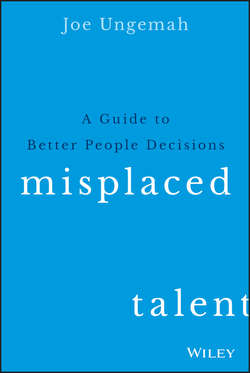Misplaced Talent

Реклама. ООО «ЛитРес», ИНН: 7719571260.
Оглавление
Ungemah Joe. Misplaced Talent
Foreword
Preface
Chapter 1. Frameworks
Origins of Job Analysis
The Art and Science of Job Analysis
Behavioral Simplicity
The Tradeoffs
The Good and Bad of Frameworks
Chapter 2. Talent Acquisition
More Than a Single Brand
Let’s Be Realistic
Compelling Themes
From Message to Market
How It’s Done
Chapter 3. Capability Assessment
Evaluating Value and Risk
Legal Requirements
Assessment by Interview
Knowledge, Skills, and Abilities
Work Simulations
Where to from Here?
Chapter 4. Psychometric Assessment
But First, an Experiment
Employee Needs
Personality Traits
Shared Values
Motivated Employees Are Engaged Employees
Changes in Motivation with Age and Generations
Restoring the Balance with Person-Environment Fit
Chapter 5. Employee Development
Psychological Contract
Assessment for Development
Developmental Challenges
Support Through Coaching and Mentoring
Moving Together or Apart
Chapter 6. Change
Breaking the Psychological Contract
Succession Planning
High Potentials and the Learning Agile
Driving Performance
Big Data and Monitoring Change
From a Balanced to a Transactional Contract
Conclusion
About the Author
Acknowledgments
Resources
Index
Отрывок из книги
When Joe asked me to write a foreword for his book, Misplaced Talent, the request arrived on the very same day that I completed an article I was working on with a colleague from another university looking at the relationship between science and practice (“the science-practice gap”). We reported on some research we had been doing on the ways in which practitioners bring scientific evidence to bear in their practice within the field of “occupational psychology,” as we Brits call it, or, for those with a more European or North American background, work or industrial-organizational psychology.
Despite differences in name, what comes through from the wealth of international experience upon which this book is based is that there are many more commonalities than differences when we look at how psychology has been applied to the world of work across the globe, but yet practitioners can sometimes struggle in their attempts to translate and apply to their own practice the very rich body of scientific research and theory upon which the profession is based. This is why Misplaced Talent is such a useful book.
.....
Those at the top of the organization will, as I have argued elsewhere, need to become both “business model innovators” and “social facilitators,” while the way in which roles are continually reconfigured will present a challenge to those lower down in the hierarchy, even as those hierarchies themselves shift their shapes.
Those charged with matching people to these new roles must align a more diverse set of people through networks of “open innovation” and, while we cannot predict exactly how the story will unfold, the only certainty is that the organizations of tomorrow will be radically different from those of today in ways that we have yet to imagine. Misplaced Talent provides a valuable resource for any practitioners faced with the immense challenge of responding to these trends as they negotiate their way through this rapidly changing backdrop to develop the dynamic capabilities upon which the organizations of the future will depend.
.....